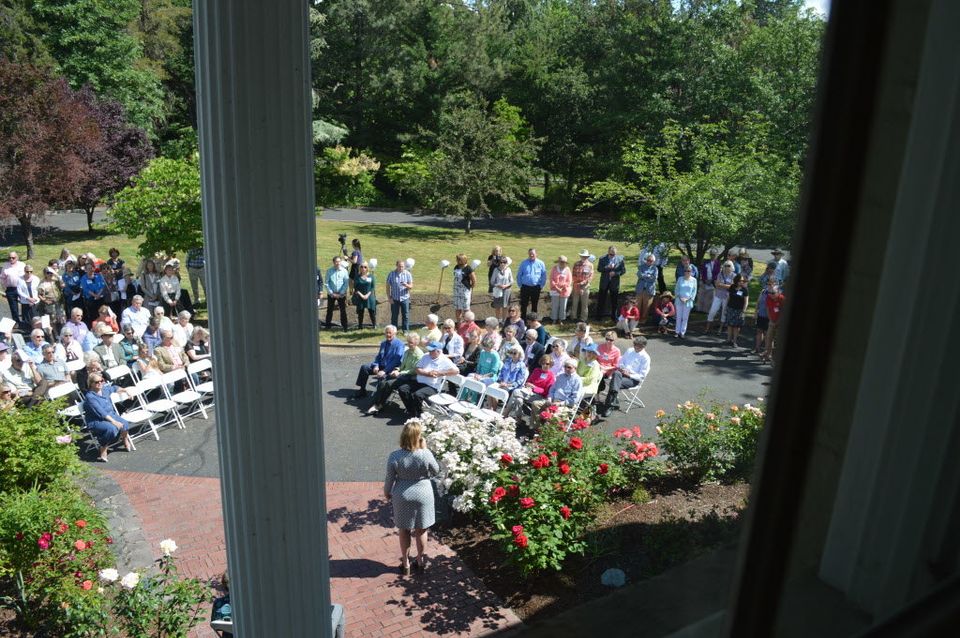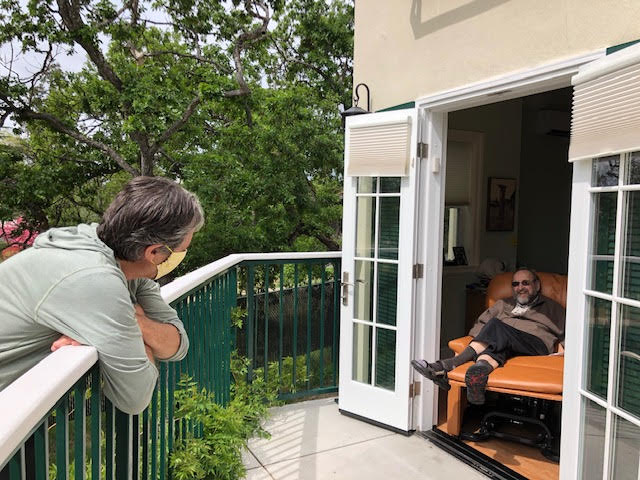Southern Oregon Friends of Hospice, The HUB – Hospice Unique Boutique and Celia’s House
The story of what makes Southern Oregon Friends of Hospice and Celia’s House so special and unique is about a small group of people from our local community. Beginning in 2008 they shared a dream of helping to bring end-of life comfort and peace to those unable to do so in their own homes. By 2018, they purchased and transformed an iconic old house into a 12-room model of true excellence in end-of-life care, serving our entire region.
2008
Initially formed as a non-profit advisory board to Ashland Community Hospital Hospice, the organization refocused its mission to collaborate with all hospices in Jackson and Josephine Counties. The dream was to create a freestanding hospice house. The first fundraiser, “parking lot sale,” was held at the Ashland Elks Lodge in July. Word of mouth to friends and relatives provided the goods for a successful sale, netting $2,500 on one very hot July day!
2009
A Board of Directors was elected in January. They applied for and received nonprofit status in March. The first project was to create a funding source for the organization by opening a resale shop. In April, a big moment came when the Board held a “Go” or “No Go” vote to open the resale shop. It was a unanimous “Go!” with only $6000 in the bank. They hired a manager for the Hospice Unique Boutique and held a grand opening in June.
2010
The organization celebrated the 1st anniversary of the Hospice Unique Boutique by granting $5000 from the proceeds to the four hospices in the Rogue Valley, as well as to Threshold Choir and WinterSpring Center for Bereavement and Loss. In December, nursing students from the OHSU nursing program at SOU conducted a feasibility study for a freestanding hospice house.
2011
The organization officially changed its name to Southern Oregon Friends of Hospice (SOFH)
Short-term goals focused on creating a virtual resource center website and educating the community about hospice and palliative care services. The long-term goal continued to be creation of a freestanding hospice residential care facility. We celebrated the 2nd anniversary of Hospice Unique Boutique in June and awarded the second round of granting funds, $10,000 to:
-COHO (Choosing Options/Honoring Options)
-Asante Hospice
-Providence Hospice
-Ashland Hospice
-Lovejoy Hospice
-Winterspring Center for Grief and Bereavement
2012
Susan Hearn was hired as the first Executive Director. Southern Oregon Friends of Hospice celebrated its 3rd anniversary of the Hospice Unique Boutique and awarded a third round of granting funds, $30,000 to:
-COHO (Choosing Options/Honoring Options)
-Asante Hospice
-Providence Hospice
-Ashland Hospice
-Lovejoy Hospice
-Winterspring Center for Grief and Bereavement
2014
Planning for a capital campaign began and committees were formed. Architect Ken Odgen designed plans for a Southern Oregon hospice residential care facility based on compassionate hospice principals. Sue Carroll was hired to assist with Development. The Department of Human Services approved proceeding with plans to build a hospice house. Over $9,000 in gifts were awarded to COHO, WinterSpring, and Trinity Respite Center. We celebrated the Hospice Unique Boutique’s 5th anniversary and the 18 volunteers who served all 5 years with a lovely event at Grizzly Peak Winery. We welcomed a talented and diverse group of community leaders to the Honorary Board.
2015
Consultant Casey Woodard completed a feasibility study to determine community support for the hospice house project and capital campaign. Southern Oregon Friends of Hospice awarded a $5,000 gift to WinterSpring Center and COHO (Choosing Options/Honoring Options) to receive in-kind training community education services.
2016

Through the generosity and dedication of many donors and volunteers, Southern Oregon Friends of Hospice purchased the iconic Medford home originally built in 1939 for Harry Holmes of Harry & David. Dana Crawford of Ogden, Roemer, Wilkerson created plans to renovate the house into a 12-bed hospice residential care facility. Ausland Group was selected to be the builders and KenCairn Landscape Architecture for landscape design. Davis Wilkins, MD, accepted the role of Capital Campaign Chair to lead the serious work of raising the $4 million necessary to fund the project. Susan Hearn, Executive Director, and Sue Carroll, Development Coordinator, moved their office into the Holmes Park House on November 1, 2016. With the incredible help of our volunteer interiors team, the house was completely furnished and decorated with items from our generous donors and the Hospice Unique Boutique.

2017
The plans for the Holmes Park House renovations and eight-bed addition were approved by the City of Medford and State of Oregon Health Authority in May. Following this approval, People’s Bank of Commerce approved a construction line of credit to begin in June. Having reached the $2 million mark in our capital funding campaign, a ground breaking was held June 1st to honor the donors, leaders, and creators who have made this project a reality. The public phase of the capital campaign began in September with over two-thirds of our initial funding goal met. Initial planning for operations, training, and cultural development were underway for a planned spring 2018 opening.
2018
The capital campaign reached its goal—raising over $4 million with a generous naming gift from the Jed & Celia Meese Foundation, to officially be called Celia’s House in Holmes Park in honor of Celia Meese.

The construction and licensing of 12- bed Celia’s House in Holmes Park House residential hospice care was completed. On May 14, 2018 doors opened to residents. By the end of 2018 over 70 residents were served and hundreds of families and loved ones were supported. Newly hired staff and committed resident support volunteers provided kind and compassionate care.
2019
Celia’s House staff cared for 134 residents and supported over 1,000 of their visitors.
Staff continued to observe how critical a culture of caring is, not just for residents but their families as well. Having a comfortable space for family members to visit and even stay the night is important and unique.

Over 200 volunteers provided 13,000+ hours of their time sitting at the bedside, working in the garden, greeting at the door, serving the meals, leading and participating in committees, and working in the Hospice Unique Boutique.
Residents came from all over Jackson and Josephine counties, as well as Klamath Falls and Brookings.
Through grants and the generosity of over 500 donors, 42 percent of residents received financial assistance. Three local Medicare Certified hospice providers, specifically Asante Hospice, Providence Hospice and Signature Hospice, collaborated with the Celia’s House care team to support their hospice patients 24 hours a day, every day.
2020
The opening months of 2020 saw Celia’s House operating with a mature staff at full capacity – with 12 residents admitted and a wait list for entry. As March faded into April, the Covid-19 pandemic affected our community.
Our 12-member COVID Response Team began meeting weekly to address safety issues and new regulations. Out of precaution, our incredible volunteer team was put on hiatus until conditions improved.


Yet Celia’s House resident care stayed focused on what mattered most at the end of life. Two months of lockdown orders for The HUB (SOFH fundraising resale boutique) impacted revenue along with some precautionary reductions in the number of residents accepted for admission.
Celia’s House was granted a Specific Needs Contract from Medicaid – the first in Oregon for a dedicated residential hospice facility, allowing us to expand care to low–income individuals.
In the fall, the Almeda Fire came dangerously close to Celia’s House. Staff chose to help evacuate our hospice residents even while some staff were losing their own homes or were asked to evacuate them.
Our first full-time development director was hired, and after eight years, our beloved executive director Susan Hearn moved on to new challenges.
Fall also saw the completion of a parking lot circle garden, funded by new donors and installed by our dedicated volunteer garden team. The Carrico Foundation sponsored Angel Reflection Garden was also completed, including a donor and volunteer recognition wall and memorial bricks honoring our residents.
2021
Even with Covid operation, financial impacts, and key personnel changes, Southern Oregon Friends of Hospice, Celia’s House and The HUB accomplished great things during a complex time. In October, we were excited to announce our new executive director, Dwight Wilson, RN, MN.
To keep everyone safe, visitor restrictions impeded our volunteers’ ability to be with residents at the bedside. Masks, gowns and face shields in place, everyone still found unique ways to support our residents, families, caregiving staff, and volunteers by keeping hearts focused on quality end-of-life care and experiences.
We are so grateful to the many community donors that helped us meet rising costs during our Volunteers & Friends fundraising appeal. The subsequent generosity of Jed & Celia Meese allowed us to pay off Celia’s House mortgage – a monumental gift that saved $6,330 in monthly payments! A second government “Payroll Protection Plan” loan helped us retain and pay all our employees during the darkest pandemic days.
With the organization’s emphasis on inclusion, residents who qualify are now financially benefitting from assistance agreements with Asante, Providence, and Medicaid. Six of our 12 beds are now dedicated for financial assistance through our hospital partners, Medicaid, and the Celia’s House Care Fund. In partnership with the Oregon Community Foundation and through the contributions of visionary donors, we were able to establish an Endowment fund to build long-term sustainability. The HUB resale store continued to shine brightly, providing 18% of our revenue; and with the aid of vaccinations, volunteers began returning to Celia’s House, bringing joy to residents and staff alike.
2022
We can never say thank you enough for all the ways our community provides support. This year was good to us, even in the face of headwinds: COVID-19, a community-wide shortage of caregivers, and an ambitious aspiration to serve residents from all backgrounds and financial needs. Celia’s House continued to lead as a unique nonprofit model for end-of-life care throughout Oregon; we had our best fundraising year; and 2022 accomplishments focused on solidifying our future.
2022 Accomplishments
- We proudly issued our first comprehensive annual report, providing a snap shot of the year including a financial report. You can view the 2022 Annual Report at: 2022 Annual Report
- Provided care for everyone who needed us, regardless of their financial situation.
- Recruited and retained compassionate staff.
- Simplified admission processes for Celia’s House.
- Volunteers returned to support residents, loved ones, and staff.
- Expanded our No One Dies Alone program.
- Held our first annual Remembrance event to honor all residents that died at Celia’s House the previous year. Family and friends were invited to view engraved memorial paver bricks—one with each former resident’s name— and enjoy food and drink in the beautiful outdoor garden.
- Strengthened relationships with our hospice partners and Medcaid certified all 12 of our beds.
- Educational outreach increased through community presentations and well-attended OLLI classes.
- We updated and improved our Website for ease of use.
- The HUB (Hospice Unique Boutique) continued to be a trusted source of funds, providing 16% of our revenue.
- Our Board of Directors transitioned from involvement in day-to-day operations to a financial and strategic governing role, focusing on priorities for our organization’s long-term success. The Board expanded to help us better reflect the diverse community we serve and set community outreach as an important priority.
